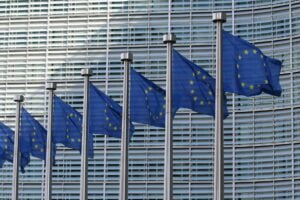In April, our Community Meeting was focused on the topic of Identity Management. We delved into crucial topics surrounding identity, data sharing, and trust within digital ecosystems, with a diverse lineup of speakers and engaging presentations. In case you were unable to attend the sessions live, you will find the key highlights, recordings and slides in this article.
European Digital Identity regulation, Trust Services & Wallets – exploring possibilities for Data Spaces to boost trust for data sharing
Yekaterina Travkina (Innopay and CoE-DSC) explained how European Digital Identity (EUDI) regulation (known as the amendment of eIDAS) can enhance trust and enable secure data sharing through sharing practical examples and insights into Trust Services and EU Digital Identity Wallets from existing data sharing initiatives. Her key take-aways were:
- Explore use cases: to ensure interoperability in the long run, collaboratively explore use cases where data space participants can benefit from EU Digital Wallets & Trust Services.
- Stay updated: check if your initiative falls into a domain mandated for EUDI wallet acceptance, and stay in touch with regulatory news and updates on EU channels.
- Join CoE-DSC exploration of European Digital Identity for data spaces & initiatives: in 2024, the CoE-DSC will organise co-creative workshops on DI solutions as part of Data Spaces Interoperability Compass activities. Reach out via dsic@coe-dsc.nl to join this exploration!
The iSHARE Trust Framework: A Step Closer to a Decentralised Data Ecosystem
Gerard Huis in ‘t Veld (iSHARE) elaborated on the transformative role of the iSHARE Trust Framework in enabling seamless data sharing while maintaining data ownership and control, with real-world case studies, such as the Climate Agreement Actions for Businesses, highlighting its effectiveness. His key take-aways:
- A trusted environment for data sharing is more than just a trusted identity.
- The iSHARE Trust Framework provides a solid foundation for data spaces to create such a trusted environment through legal, organisational and technical agreements, using existing identities.
- By basing data spaces on a similar framework, data spaces become interoperable, enabling data rights holders to better control the use of their data.
Decentralised provenance and traceability with mintBlue
Niels van den Bergh (Mintblue) shared insights into decentralised provenance and traceability technology through practical use cases, including collaborations with Belastingdienst and Kamer van Koophandel. His key take-aways:
- Self Sovereign Identity (SSI) can be extended with Distributed ledger technology (DLT) to create tokenised assets (contracts, documents, invoices, payments, receipts) that can be validated for authenticity and origin.
- Independent notarisation services are a critical tool to give organisations and individuals with absolute data ownership. It is the only way to create a future where we can verify if something is authentic autonomously.
- The trend with centralised cloud solutions has created trusted intermediaries in our digital society. Only with decentralised technologies can we validate authenticity without reliance on a trusted external party.




